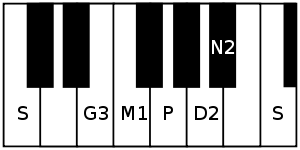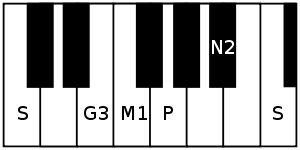Bahudari
| Carnatic music |
|---|
| Concepts |
| Compositions |
| Instruments |
|
Bahudari (pronounced bahudāri) is a rāgam in Carnatic music (musical scale of South Indian classical music). It is a derived scale (janya rāgam), as it does not have all the seven swaras (musical notes), derived from the 28th Melakarta raga Harikambhoji.[1]
Structure and Lakshana


Bahudari is an asymmetric scale that does not contain rishabham. It is called a shadava-audava rāgam,[1][2] in Carnatic music classification (as it has 6 notes in ascending and 5 notes in descending scale). Its ārohaṇa-avarohaṇa structure is as follows (see swaras in Carnatic music for details on below notation and terms):
This scale uses the notes shadjam, antara gandharam, shuddha madhyamam, panchamam, chathusruthi dhaivatham and kaisiki nishadam.[1][2]
Popular compositions
Bahudari is a melodious rāgam.[1] Here are some popular compositions in Bahudari.
- Brova barama composed by Thyagaraja
- Marakoti sundari and Unnadiye gatiyendru by G. N. Balasubramaniam
- Sadananda tandavam seyyum by Achutadasar
References
- 1 2 3 4 Ragas in Carnatic music by Dr. S. Bhagyalekshmy, Pub. 1990, CBH Publications
- 1 2 Raganidhi by P. Subba Rao, Pub. 1964, The Music Academy of Madras
| ||||||||||||||||||||||||||